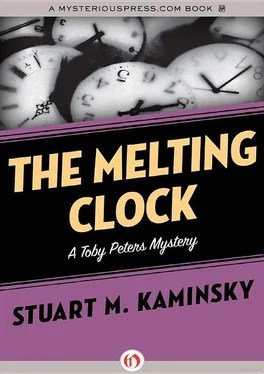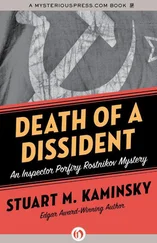Stuart Kaminsky - Melting Clock
Здесь есть возможность читать онлайн «Stuart Kaminsky - Melting Clock» весь текст электронной книги совершенно бесплатно (целиком полную версию без сокращений). В некоторых случаях можно слушать аудио, скачать через торрент в формате fb2 и присутствует краткое содержание. Жанр: Криминальный детектив, на английском языке. Описание произведения, (предисловие) а так же отзывы посетителей доступны на портале библиотеки ЛибКат.
- Название:Melting Clock
- Автор:
- Жанр:
- Год:неизвестен
- ISBN:нет данных
- Рейтинг книги:4 / 5. Голосов: 1
-
Избранное:Добавить в избранное
- Отзывы:
-
Ваша оценка:
- 80
- 1
- 2
- 3
- 4
- 5
Melting Clock: краткое содержание, описание и аннотация
Предлагаем к чтению аннотацию, описание, краткое содержание или предисловие (зависит от того, что написал сам автор книги «Melting Clock»). Если вы не нашли необходимую информацию о книге — напишите в комментариях, мы постараемся отыскать её.
Melting Clock — читать онлайн бесплатно полную книгу (весь текст) целиком
Ниже представлен текст книги, разбитый по страницам. Система сохранения места последней прочитанной страницы, позволяет с удобством читать онлайн бесплатно книгу «Melting Clock», без необходимости каждый раз заново искать на чём Вы остановились. Поставьте закладку, и сможете в любой момент перейти на страницу, на которой закончили чтение.
Интервал:
Закладка:
“I’ll ration his Apples Eisenhower,” I promised.
“Speaking of rations,” she said. “Stamp number twenty-four in War Ration Book One is good for one pound of coffee until January twenty-one. Sugar stamp number ten in War Ration Book One is good for three pounds of sugar until January fifteen. Gasoline A coupon number four is good until January twenty-one. Stamp number seventeen in War Ration Book One is good for one pair of shoes until June fifteen.”
I didn’t ask how she remembered all of this. I just said, “You can have them all, Mrs. Plaut”
She nodded and went on, “Blue A, B, and C stamps in War Ration Book Two will be issued in February. They are worth forty-eight points worth of canned and other processed foods for the month of March.”
“You may have them all, Mrs. Plaut”
“War is hell, Mr. Peelers.”
“I’ve got to go, Mrs. Plaut. Dali’s expecting me.”
“The one from Tibet,” she said knowingly.
I’d been through this with her before so I said, “Yes, Mrs. Plaut.”
“Book or pests?” she asked.
It took me a beat to understand. “No, he hasn’t written a book and he doesn’t need an exterminator.”
“Ah,” she said with a very knowing smile. “They’re wrong about the kindergarten thing, you know.”
“They’re wrong,” I agreed. “I’ll see you later.”
My khaki-colored Crosley was, as all Crosleys are, almost small enough to pick up and carry under one arm. I’d bought mine used from No-Neck Arnie the mechanic for two hundred dollars. He’d got it from a guy who’d picked it up at a hardware store in 1940. It wasn’t a bad car. Maybe the reason it didn’t catch on was the brilliant marketing idea of selling them in hardware and appliance stores like ladders and coping saws.
I was feeling pretty good when I turned the corner at Heliotrope and drove over to Arlington to head north. Crossing the street when I got to Arlington were a man and a woman. The woman looked like Anne. I drove past and looked back. It wasn’t Anne.
I had paid No-Neck Arnie fifteen bucks to install a radio in the Crosley. Crosleys came without frills-just a speedometer, a fuel gauge, and a water gauge, but I needed company when I drove. One of the Eberle brothers was singing “This Love of Mine.” I turned the radio off and paid attention to the road.
3
The address wasn’t hard to find. It was set in white stones on a black marble slab. The house itself, a big brick English-looking thing with slanted red roofs set back about a hundred yards from the street on a paved driveway, couldn’t be seen through the small forest of trees in front of it. Since there weren’t any guards, walls, or gates, whoever owned it probably wasn’t in the movies or the rackets.
There were two cars in the driveway, though I could see a garage at the side of the house with its doors up and enough room for the Beverly Hills fire department. Inside the garage a man with his back to the driveway was washing a car the size of Hoover Dam and the color of a robin’s egg. I parked behind a white 1941 Lincoln convertible with its top down. Parked in front of the Lincoln was something I’d never seen before.
I walked over to look at it and still didn’t know what I was looking at. It looked a little like a Cord but …
“It’s a Hupmobile,” came a voice behind me.
The guy was about forty, tall, thin, a lopsided Henry Fonda type, only older with graying temples. He was wearing grease-smeared overalls. His hair flowed forward, almost covering his eyes. A spot of oil in the shape of a lima bean smudged his cheek. He was wiping his hands with a once-white rag.
“Only three hundred nineteen of them made,” he said. “Got it for less than eleven hundred. Keep it in shape, it should be worth forty or fifty thousand in twenty years. Should have bought a dozen of them but where would I put them?”
He looked around and it seemed to me he had enough room for at least twenty-five or thirty of the Hups.
He held out his hand and I took it. The grip was firm and the smile sincere.
“Barry T. Zeman,” he said.
“Toby Peters,” I said.
“That automobile J.T. is working on,” he said, nodding toward the blue Hoover Dammobile. “A 194 °Cadillac Fleetwood Series town car.”
“Looks great.”
“Take care of that Crosley of yours and it’ll be worth something in twenty years,” he said, nodding at my car.
“I need it for transportation,” I said.
“The future,” he said, pushing his unruly hair back. “That’s where I live. That’s how I made my money.”
“The present,” I said. “That’s where I live and why I don’t have any money. This is your place?”
“My place, and my wife’s. You’re the detective.”
“I’m the detective,” I admitted, following him up the stone walk to the front door, which opened suddenly. A woman the size of Alaska stepped out, closed the door, and looked over our heads down the driveway. Her yellow-white hair was bun-tight and her cloth coat was open, revealing a serious white uniform. I glanced back over my shoulder to the driveway, where a cab was pulling up. Zeman and I parted so the woman could get through.
He leaned back in. “Find the paintings and the clocks or tell them as soon as you can that you can’t do it,” he said softly. “I’ll give you five hundred cash if this is all over either way in two days.”
Behind us the cab door opened and closed and, a beat later as Zeman opened his front door, the cab took off.
“Five hundred,” he repeated. “I’ve got an investment in Salvador Dali. Quite a collection, thirty paintings, drawings, and even some jewelry and sculpture. You’ll see it inside. Know what it’ll be worth in twenty years?”
“As much as a Hupmobile,” I guessed.
“Much more,” he said with a grin. “I’ve got an investment in the man, an investment for me, my kids, my grandchildren. I’ll be nice to him. That’s business, but I tell you, Toby, between the two of them, they drive me and the wife crazy nuts. Wife’s taken off for Palm Springs till they go. I’m a prisoner of my investments.”
“I’ll do my best to wrap this up in two days,” I said, “but …”
He pulled a business card from the pocket in the bib of his overalls and handed it to me. It had a little thumb print on it and an address and phone number on Sunset Boulevard. Mr. Zeman’s line of business was printed under his name: Investments. I unzipped my wind-breaker pocket, tucked the card away, and zipped up again as Zeman opened the door and let me in.
The living room into which we walked was bright and big, white walls to a skylight in the ceiling. The furniture was all modern, whites and blacks with hardwood floors and colorful patterned rugs.
“Decorated by Dali himself to show off the paintings,” said Zeman, folding his hands behind him as I looked around at the walls and the seven pictures hung there. They were all different sizes. The smallest was a black-and-white study of an egg on a seashore. Something had pecked through the egg and was trying to get out, something with a beak and a human arm. The painting was about the size of the cover of an atlas.
There were bigger ones, some of them filled with little objects, all of them colorful. Seashores or deserts with long pianos on the beach and old men with huge behinds hovering over girls. Seashells and limp things that shouldn’t be limp, books, shells, pianos, radios, watches. They looked like they were melting from the heat. A grasshopper sat on the shoulder of a woman who was kissing a tall man. From the angle you couldn’t be sure whether he was, in fact, kissing her or the grasshopper.
“Response?” asked Zeman, beside me.
Читать дальшеИнтервал:
Закладка:
Похожие книги на «Melting Clock»
Представляем Вашему вниманию похожие книги на «Melting Clock» списком для выбора. Мы отобрали схожую по названию и смыслу литературу в надежде предоставить читателям больше вариантов отыскать новые, интересные, ещё непрочитанные произведения.
Обсуждение, отзывы о книге «Melting Clock» и просто собственные мнения читателей. Оставьте ваши комментарии, напишите, что Вы думаете о произведении, его смысле или главных героях. Укажите что конкретно понравилось, а что нет, и почему Вы так считаете.












